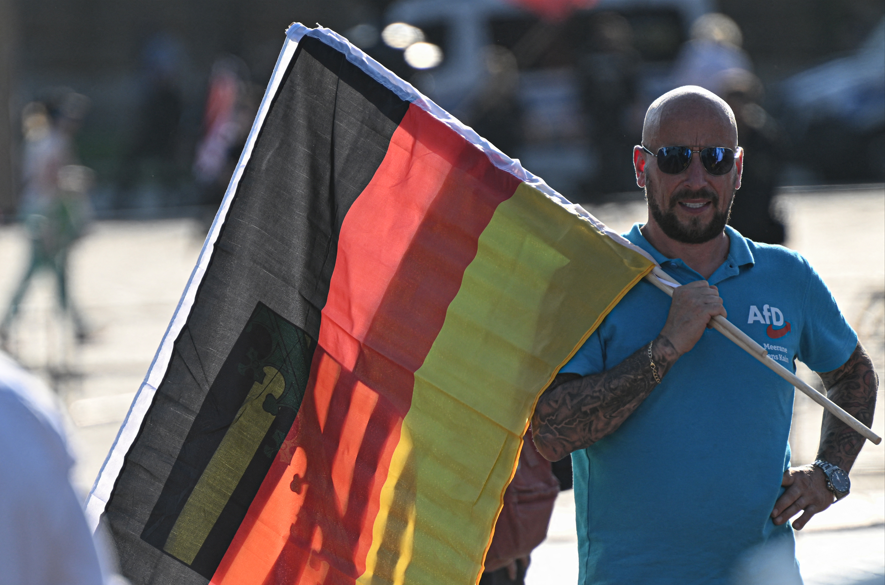The far right is on the verge of winning the most votes in German state elections for the first time since the Nazis.
For some in Germany, the rise of Alternative für Deutschland (AfD) is a downright nightmare.
However, others, especially in the east, say the AfD offers an opportunity for change.
The temperature in German politics has been rising all year long, and Sunday’s elections in Thuringia and Saxony could reach boiling point.
“Liar!” shouted a small group of people in Thuringia this week as Chancellor Olaf Scholz took the stage in the city of Jena.
Cries of “Volksverräter” also rang out among the wider applause; an expression meaning “traitor of the people” and seen by many as an expression with Nazi connotations.
Chancellor Scholz’s Social Democratic Party and his coalition partners the Greens and the Liberals are doing so badly in Thuringia that they may not even get a seat in the state parliament, while the AfD is leading in the polls.
In neighboring Saxony, the AfD is neck and neck with the conservative CDU.
Last week’s knife attack, in which a Syrian asylum seeker and suspected Islamist was accused of killing three people, has sparked fierce criticism of the way successive governments have handled migration.
A hasty – you might even say panicky – reaction has seen ministers announce tougher asylum and knife crime laws.
But it is unlikely to assuage a broader discontent that – for many AfD supporters – is not just based on anger over “mass” immigration.
People also say they want to push back against what they see as overzealous green policies, state intervention and unwise military support for Ukraine.
In the East, all this is accompanied by a despondency and frustration that has been simmering for years, even decades, about the consequences of German reunification.
“You can constantly see where the east begins and where the west begins,” says 16-year-old Constantin, riding into the town of Meiningen on his East German Simson S50 moped.
“The East and the West, it is true that it is now connected. It is one Germany. But we see, in the difference, it is great.”
The view from the trainee car mechanic is the same as that of the streets of the towns and villages that were once part of the communist GDR.
The feeling of being looked down upon has combined with resentment over the West’s stronger industrial base, higher wages and historic pension disparities.
“We are being forgotten,” says Constantin, who firmly supports the AfD – as do many young people, according to polls.
He, like every AfD supporter I have ever spoken to, is dismissive of the accusations of extremism that increasingly dogged the party.
A BBC investigation earlier this year, found clear links between party figures and networks considered extremist by state authorities.
In Thuringia, the party is officially considered far-right, while the state’s highly controversial leader, Björn Höcke, was recently fined for using a Nazi slogan. He denies, however, that he did so deliberately.
However, party supporters often say they believe both the domestic intelligence service and the mainstream media are actively trying to smear their movement.
Some will consider this a dishonest or misleading defence, but there is – in the East – a deep-seated suspicion of the state among communities that once endured the activities of the Stasi, the reviled secret police in communist East Germany.
“The people who live here have already experienced what it is like when the government interferes too much,” says Vivien Rottstedt, a 31-year-old lawyer and AfD candidate in Thuringia.
Restrictions during the Covid pandemic and the perception that people are being forced to adhere to ‘politically correct’ positions appear to have fuelled public distrust.
“People from East Germany know exactly what it’s like when you’re no longer allowed to express your own opinion,” she tells me as she shelters under a campaign umbrella in Meiningen in temperatures of over 30 degrees Celsius.
Meanwhile, another rebel party – the Sahra Wagenknecht Alliance (BSW) – has risen to third place in the polls in the state.
Mrs. Wagenknecht, a former communist and long one of the most prominent politicians in East Germany, has successfully combined cultural conservatism with left-wing economic policies.
But it is the AfD that seems to have the best chance of winning the most votes here. The party will also do well in Saxony and in the elections in another eastern state, Brandenburg, later this month.
While such an outcome would send shockwaves through Germany, it does not mean that the AfD will seize power. It is likely that other parties will unite as part of an ongoing “firewall” against the far right.
Yet it is all a disaster for struggling Chancellor Scholz and his constantly bickering coalition.
“It is new for Germany that we have this three-party coalition and it hurts a lot when there are a lot of conflicts,” says SPD activist Levi Schlegtendal.
He stands behind a stall in Jena and remembers how different everything was when Olaf Scholz entered the chancellery three years ago.
“It was said back then, in 2021, that we needed someone like (former Chancellor Angela) Merkel, and that was him,” Levi says – recalling the wish for a “calm” and anti-populist candidate.
“Now times have changed due to the coronavirus and the crisis in Ukraine, and it seems he has no time left.”
The outcome of these elections is not only of crucial importance for the residents of Thuringia, Saxony and Brandenburg.
They will be judged as a litmus test for public opinion a year before federal elections, with few predicting that this traffic light coalition experiment can – or will – be repeated.
The CDU looks set to take over the chancellery under Friedrich Merz, but he is striking a more right-wing tone as established parties desperately try to reverse the rise of the AfD.

